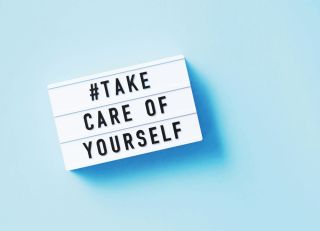Self-Control
Reskilling for Emotional Well-Being
Why employers should help employees re-learn the principles of self-care.
Posted January 10, 2023 Reviewed by Abigail Fagan
Key points
- There is a global mental health crisis in the workforce that needs to be addressed.
- The gap between employer and employee perceptions needs to be closed.
- Personalized reskilling for self-care and emotional well-being is essential. Reskilling for enhanced self-compassion can go a long way.

A long time ago, self-care meant brushing your teeth in the morning and going through your usual morning ablutions. However, as we look at the trends post-pandemic and in the context of the current climate and financial challenges, there are alarming patterns that need to be nipped in the bud.
Threats to brains and bodies globally
While study designs and actual numbers differ, there is reason to be concerned about the levels of burnout, depression, anxiety, and suicidality1–4. Symptoms of depression have tripled while deaths from drug overdoses continue to climb5. Also, the recent findings of neuroinflammation post-pandemic in people with6 and without7 COVID infections, and the fact that prevalence rates for long-COVID range from 20-50%8,9, raise concerns that a mental health crisis is developing. There is also a global increase in the prevalence of fatigue, brain fog, and other "sickness behavior"7. Many people are feeling a little “off”.
The gap between employers and employees
Leaders believe that they have provided what their employees need, yet a survey from McKinsey & Co. illustrates that there is a huge disconnect. Sixty-five percent of employers believe they support mental health, whereas 51% of employees feel supported. Seventy-one percent of employers believe that they are supporting frontline employees’ mental health well or very well, whereas 27% of frontline employees agree. There’s a gap—and it’s unlikely to be monitored or filled. Therefore, employers would be wise to consider self-directed reskilling for emotional well-being.
Most people have poor self-care and low self-compassion
Self-care requires self-awareness, self-control, and self-reliance10. People often know they are fatigued or burned out, but they have self-control depletion11, having exhausted the parts of the brain necessary for self-control. When people let stress and anxiety become the norm, they endanger their bodies because this takes a toll on their genes12, and as a result, their bodies, too13. As people get older, reports indicate rates as high as a six-fold increase in 1-year mortality of self-neglecters with as high as a 15-fold increase of mortality for individuals with self-neglect compared to those without self-neglect14.
Why are people bad at self-care?
Seven factors pose challenges to self-care15. They are: attachment to unhealthy behaviors; lack of motivation to change; difficulty deciding when in the lifespan to adopt a healthy lifestyle; difficulty in maintaining healthy behavior over time; multimorbidity — difficulty integrating self-care across conditions; inadequate response to symptoms, knowing the right time to seek help; life events that interact with illness to interfere with healthy behavior.
Reskilling for self-compassion
People need to re-learn how to care for themselves. Having a kind, accepting and mindful stance toward one’s flaws and failures may reduce stress and promote health behaviors16. It is also associated with lower levels of depression and greater attention. The brain is primed to respond to emotions more sensitively, too17.
Out of 525,600 minutes in a year, patients spend only on average 66 minutes or 0.01 % of the time with healthcare professionals18. Prioritizing self-care interventions is a worthwhile investment because it will help employees implement positive lifestyle changes19. The beneficial effects of self-care include improved well-being and lower morbidity, mortality, and healthcare costs.
How to create a system for reskilling for self-care
The following factors can help the reskilling process for emotional well-being and self-care15: Help people feel motivated with human contact and empathy; tailor interventions using technology and a culture that supports this; provide the opportunity for peer support; provide a channel to healthcare professionals; provide a technology interface to track self-care; provide skills both formally and informally; include self-care in policies.
There is no one-size-fits-all
What most employers miss is the fact that there is no one-size-fits-all. Some messages land, whereas others do not, and it’s the same for interventions. It’s not a luxury to personalize interventions; it’s a necessity, both for the employee and the organization. What “works” is not what works for the group but what works for the individual.
Conclusion
Reskilling should begin with reskilling for self-care to enhance emotional well-being. Without this crucial step, we are likely to be growing increasingly disabled workforces, thereby disrupting productivity and ignoring preventable chronic conditions.
References
(1) Reith, T. P. Burnout in United States Healthcare Professionals: A Narrative Review. Cureus 10 (12), e3681. https://doi.org/10.7759/cureus.3681.
(2) Hidaka, B. H. Depression as a Disease of Modernity: Explanations for Increasing Prevalence. J Affect Disord2012, 140 (3), 205–214. https://doi.org/10.1016/j.jad.2011.12.036.
(3) Slee, A.; Nazareth, I.; Freemantle, N.; Horsfall, L. Trends in Generalised Anxiety Disorders and Symptoms in Primary Care: UK Population-Based Cohort Study. Br J Psychiatry 218 (3), 158–164. https://doi.org/10.1192/bjp.2020.159.
(4) Xiao, Y.; Cerel, J.; Mann, J. J. Temporal Trends in Suicidal Ideation and Attempts Among US Adolescents by Sex and Race/Ethnicity, 1991-2019. JAMA Netw Open 2021, 4 (6), e2113513. https://doi.org/10.1001/jamanetworkopen.2021.13513.
(5) Schrepf, A. When Even the Ground Was Burning: Neuroinflammation in the Wake of COVID-19. Brain Behav Immun 2022, 105, 27–28. https://doi.org/10.1016/j.bbi.2022.06.009.
(6) Vanderheiden, A.; Klein, R. S. Neuroinflammation and COVID-19. Curr Opin Neurobiol 2022, 76, 102608. https://doi.org/10.1016/j.conb.2022.102608.
(7) Brusaferri, L.; Alshelh, Z.; Martins, D.; Kim, M.; Weerasekera, A.; Housman, H.; Morrissey, E. J.; Knight, P. C.; Castro-Blanco, K. A.; Albrecht, D. S.; Tseng, C.-E.; Zürcher, N. R.; Ratai, E.-M.; Akeju, O.; Makary, M. M.; Catana, C.; Mercaldo, N. D.; Hadjikhani, N.; Veronese, M.; Turkheimer, F.; Rosen, B. R.; Hooker, J. M.; Loggia, M. L. The Pandemic Brain: Neuroinflammation in Non-Infected Individuals during the COVID-19 Pandemic. Brain, Behavior, and Immunity2022, 102, 89–97. https://doi.org/10.1016/j.bbi.2022.02.018.
(8) Nearly One in Five American Adults Who Have Had COVID-19 Still Have “Long COVID.”https://www.cdc.gov/nchs/pressroom/nchs_press_releases/2022/20220622.htm (accessed 2023-01-10).
(9) Imoto, W.; Yamada, K.; Kawai, R.; Imai, T.; Kawamoto, K.; Uji, M.; Kanda, H.; Takada, M.; Ohno, Y.; Ohtani, H.; Kono, M.; Hikiishi, A.; Eguchi, Y.; Namikawa, H.; Kawaguchi, T.; Kakeya, H. A Cross-Sectional, Multicenter Survey of the Prevalence and Risk Factors for Long COVID. Sci Rep 2022, 12 (1), 22413. https://doi.org/10.1038/s41598-022-25398-6.
(10) Martínez, N.; Connelly, C. D.; Pérez, A.; Calero, P. Self-Care: A Concept Analysis. Int J Nurs Sci 2021, 8 (4), 418–425. https://doi.org/10.1016/j.ijnss.2021.08.007.
(11) Masicampo, E. J.; Martin, S. R.; Anderson, R. A. Understanding and Overcoming Self-Control Depletion. Social and Personality Psychology Compass 2014, 8 (11), 638–649. https://doi.org/10.1111/spc3.12139.
(12) Gottschalk, M. G.; Domschke, K.; Schiele, M. A. Epigenetics Underlying Susceptibility and Resilience Relating to Daily Life Stress, Work Stress, and Socioeconomic Status. Front Psychiatry 2020, 11. https://doi.org/10.3389/fpsyt.2020.00163.
(13) Johnstone, S. E.; Baylin, S. B. Stress and the Epigenetic Landscape: A Link to the Pathobiology of Human Diseases? Nat Rev Genet 2010, 11 (11), 806–812. https://doi.org/10.1038/nrg2881.
(14) Pickens, S.; Daniel, M.; Jones, E. C.; Jefferson, F. Development of a Conceptual Framework for Severe Self-Neglect (SN) by Modifying the CREST Model for Self-Neglect. Front Med (Lausanne) 2021, 8, 654627. https://doi.org/10.3389/fmed.2021.654627.
(15) Riegel, B.; Dunbar, S. B.; Fitzsimons, D.; Freedland, K. E.; Lee, C. S.; Middleton, S.; Stromberg, A.; Vellone, E.; Webber, D. E.; Jaarsma, T. Self-Care Research: Where Are We Now? Where Are We Going? Int J Nurs Stud 2021, 116, 103402. https://doi.org/10.1016/j.ijnurstu.2019.103402.
(16) Homan, K. J.; Sirois, F. M. Self-Compassion and Physical Health: Exploring the Roles of Perceived Stress and Health-Promoting Behaviors. Health Psychol Open 2017, 4 (2), 2055102917729542. https://doi.org/10.1177/2055102917729542.
(17) Pires, F. B. C.; Lacerda, S. S.; Balardin, J. B.; Portes, B.; Tobo, P. R.; Barrichello, C. R. C.; Amaro, E.; Kozasa, E. H. Self-Compassion Is Associated with Less Stress and Depression and Greater Attention and Brain Response to Affective Stimuli in Women Managers. BMC Womens Health 2018, 18 (1), 195. https://doi.org/10.1186/s12905-018-0685-y.
(18) Racine, A. D. Providers and Patients Face-to-Face: What Is the Time? Israel Journal of Health Policy Research2017, 6 (1), 54. https://doi.org/10.1186/s13584-017-0180-1.
(19) Perera, N.; Agboola, S. Are Formal Self-Care Interventions for Healthy People Effective? A Systematic Review of the Evidence. BMJ Glob Health 2019, 4 (Suppl 10), e001415. https://doi.org/10.1136/bmjgh-2019-001415.




